

H.I.V. Is Reported Cured in a Second Patient, a Milestone in the Global AIDS Epidemic. This is how far people in Africa have to travel to reach a hospital. Over the past 18 years the African Federation for Emergency Medicine, an advocacy group, has been encouraging the development of emergency care systems on the continent.
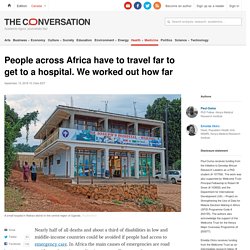
The gaps it has identified include decent transport and hospital services. But to address these challenges data is needed on the number of hospitals, their locations as well as the population marginalised. Most countries in Africa don’t have this information. They lack basic inventories of health care service providers, including the number of hospitals. The results – including how long it takes to get to a hospital – show where investment is needed in improving access. But the most urgent action is that countries must update their hospital lists, including assessment of capacity and capability to provide emergency care and updating of the private sector. Building the database. CBC.ca. An Alberta woman is the first adult in Canada to be cured of sickle cell anemia with the help of a sister's love — and a stem cell transplant.

Revée Agyepong, 26, of Edmonton was diagnosed with the disease as a toddler and has never known life without it. "I remember as far back as elementary feeling sickle cell complications and not knowing what it was," she said. "I thought that everyone would go out for recess and play, then come back with a terrible headache and body pain, couldn't breathe … eventually I realized it was just me.
" Stem cell transplant cures children with sickle cell anemia, says Alberta hospital Sickle cell anemia is a genetic disease in which red blood cells change into a semi-circular shape and block blood vessels. Agyepong's disease manifested as chronic bone and joint pain, irregular heartbeat, kidney stones and shortness of breath. Successfully treated in kids She was devastated. "My sister has always been my protector, my guardian, she found a way," Agyepong said.
Cancer Will Kill Almost 1 Million Africans Annually by 2030, Says WHO - Face2Face Africa. One of the main challenges that continue to bedevil Africa, decades after many African countries acquired their full autonomy from the colonizers, is poor health.
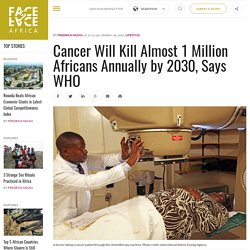
Despite the many efforts made by African governments to improve their respective health sectors, millions of Africans continue to die due to lack of proper health care. Aside from dealing with unpredicted disease outbreaks such as Ebola, Africa is also struggling to cope with ancient ailments such as cancer. In fact, cancer still remains the deadliest disease in Africa, with the World Health Organization (WHO) predicting that at least one million people in Africa will be dying of cancer annually by 2030. This means that cancer will be killing more people in Africa than anywhere else in the world. It also implies that cancer will be deadlier than HIV/AIDS, Ebola, malaria and other infectious diseases. Researchers create molecule that could ‘kick and kill’ HIV.
Current anti-AIDS drugs are highly effective at making HIV undetectable and allowing people with the virus to live longer, healthier lives.

The treatments, a class of medications called antiretroviral therapy, also greatly reduce the chance of transmission from person to person. But the medications do not actually rid the body of the virus, which has the ability to elude medications by lying dormant in cells called CD4+ T cells, which signal another type of T cell, the CD8, to destroy HIV-infected cells. When a person with HIV stops treatment, the virus emerges and replicates in the body, weakening the immune system and raising the likelihood of opportunistic infections or cancers that can sicken or kill the patient.
Researchers have been looking for ways to eliminate the “reservoirs” where the virus hides, and researchers from UCLA, Stanford University and the National Institutes of Health may have developed a solution. Scientists call the technique “kick and kill.” Bristol University study finds HIV life expectancy is 'near normal' thanks to new drugs - Bristol Post. A study from experts at the University of Bristol suggests young people on the latest HIV drugs now have near-normal life expectancy.
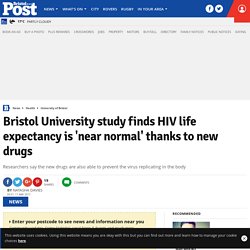
The study published in medical journal, The Lancet, suggests the increased life expectancies is due to improvements in treatments. It found 20-year-olds who started antiretroviral therapy in 2010 could like 10 years longer than those first using it in 1996. Researchers said the success of HIV treatment is a result of newer drugs having fewer side effects. They also more able to prevent the virus replicating in the body and they can make it more difficult for the virus to build up resistance to drugs. Researchers looked at more than 88,000 people with HIV from Europe and North America. Malaria: Kenya, Ghana and Malawi get first vaccine.
Image copyright D Poland/PATH The world's first vaccine against malaria will be introduced in three countries - Ghana, Kenya and Malawi - starting in 2018.
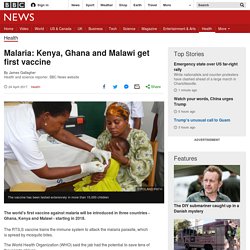
The RTS,S vaccine trains the immune system to attack the malaria parasite, which is spread by mosquito bites. The World Health Organization (WHO) said the jab had the potential to save tens of thousands of lives. But it is not yet clear if it will be feasible to use in the poorest parts of the world. The vaccine needs to be given four times - once a month for three months and then a fourth dose 18 months later.
30 million people in Africa suffer from depression - new Business Ethiopia (nBE) The World Health Organization (WHO) says currently 30 million people in Africa are suffering from depression.
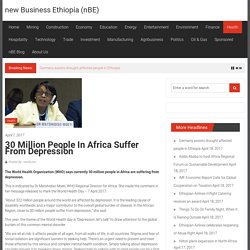
This is indicated by Dr Matshidiso Moeti, WHO Regional Director for Africa. She made the comment in her message released to mark the World Health Day – 7 April 2017. “About 322 million people around the world are affected by depression. It is the leading cause of disability worldwide, and a major contributor to the overall global burden of disease.
In the African Region, close to 30 million people suffer from depression,” she said. This year, the theme of the World Health day is “Depression, let’s talk” to draw attention to the global burden of this common mental disorder. Yes, poor oral hygiene has a huge impact on Africa, this is how… — Business — Breaking News, Nigeria News and World News – The Guardian Nigeria. Regrettably, access to oral health solutions and education is low.

The majority of Africa’s population has little or no access to proper oral health care, with the few dentists available based in the cities. In Africa, poor oral hygiene is the leading cause of school absenteeism, with children who experience dental pain missing school and performing poorly academically.1 Similarly, untreated oral diseases can cause severe pain and infection, leading to poor productivity and absenteeism among adults in the workplace.2 Despite significant achievements in the state of oral health globally, why is Africa burdened with such persistent oral care issues? Regrettably, access to oral health solutions and education is low.
The majority of Africa’s population has little or no access to proper oral health care, with the few dentists available based in the cities. Yet, simple and cost-effective measures are available. African states develop harmonized disease surveillance. Dramatic evolution within human genome may have been caused by malaria parasite. A genetic mutation that protects people from a common form of malaria spread like wildfire in sub-Saharan Africa about 42,000 years ago, according to a new study.

Today, it’s nearly impossible to find somebody from this region who doesn’t have it. That makes the mutation one of the swiftest, strongest changes to the human genome yet seen—though it remains a mystery why this particular disease sparked such a dramatic evolutionary response. The world’s most widespread type of human malaria is caused by Plasmodium vivax, a single-celled parasite transmitted by mosquitoes. In Africa, Scientists Are Preparing to Use Gene Drives to End Malaria - MIT Technology Review. In Burkina Faso, Mali, and Uganda, the groundwork is being laid for a powerful kind of experiment.
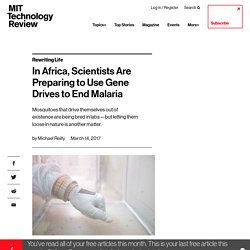
A project now under way aims to release mosquitoes that have been genetically programmed to drive themselves and their malaria-causing brethren toward extinction. As we wrote last year, the program, called Target Malaria, is meant to use a gene drive to drastically reduce the number of mosquitoes that transmit the disease in sub-Saharan Africa, where it kills hundreds of thousands of people a year. Not long ago this was merely theoretical, but modified mosquitoes with gene drives on board are already being bred and tested in labs. The idea is that a so-called selfish gene with effects that would ultimately doom the population is introduced and then replicates itself at a far higher rate than normal, spreading rapidly. Target Malaria, which is funded by the Bill and Melinda Gates Foundation, is exploring several ways to use this technology. It's time to confront Africa’s invisible killer.
Africa Telemedicine Outlook and Opportunities Report 2017: e-health Scenario and Future Government Plans for Development of e-Health Space - Research and Markets. DUBLIN, Mar 02, 2017 /PRNewswire/ -- Research and Markets has announced the addition of the "Africa Telemedicine Outlook and Opportunities" report to their offering. The report titled "Africa Telemedicine Outlook and Opportunities" provides a comprehensive analysis of e-Health scenario in Africa covering market challenges and success case studies by countries and at multinational levels. The report discusses about the current health scenario of different countries such as South Africa, Kenya, Ghana, Nigeria, Uganda, Botswana, Cameroon and Ethiopia. The report also provides current e-health scenario and future government plans for development of e-Health space in all countries. The report also includes trends & developments, growth drivers and major restraints, and challenges within the industry to understand current market dynamics in the industry.
New program aims to build genetics research capacity in Africa. February 24, 2017—A new collaboration between researchers at Harvard T.H. Chan School of Public Health, the Stanley Center for Psychiatric Research at the Broad Institute of MIT and Harvard, and six African universities and institutes aims to boost genetics research capacity in Africa, and ultimately to help close gaps in knowledge about mental health in a population historically excluded from genetics research. The GINGER (Global Initiative for Neuropsychiatric Genetics Education in Research) program has recruited 17 young African scientists who, over the course of two years starting this July, will attend workshops in Boston and London on topics including epidemiology, bioinformatics, genetics, and grant writing.
In between, they will return to their home universities, where they’ll receive virtual mentoring and onsite research skills training. The trainees will ultimately become trainers themselves, and share what they’ve learned with their colleagues. Africa Telemedicine Outlook and Opportunities Report 2017: e-health Scenario and Future Government Plans for Development of e-Health Space - Research and Markets. Pan-African public health body launched to avert crises. The Africa Centers for Disease Control and Prevention (Africa CDC) was officially launched last week at a summit of the African Union, whose membership includes every nation on the continent.
African leaders formally endorsed the idea of an African CDC last year. With the memory of the 2014-16 Ebola crisis – which quickly proliferated and left more than 11,000 people dead – still fresh, they urged for its establishment to be fast tracked. Backed by a portion of the AU’s budget contributed by its members, the Africa CDC will work to prevent another crisis like Ebola, for which African nations and the world were sorely underprepared.
It will support AU member states in preventing, detecting and responding to public health threats by improving areas such as monitoring, early warning systems and response capacity. After making substantial gains on immunisation, in recent years the continent’s progress has stalled and it is falling behind on meeting global immunisation targets. First drug-resistant malaria parasite detected in Africa. MIAMI – For the first time in Africa, a malaria parasite has been found to be partially resistant to the top anti-malaria drug, artemisinin, researchers said Wednesday, raising concern about efforts to fight a disease that sickens hundreds of millions of people each year. The discovery means that Africa now joins Southeast Asia in hosting such drug-resistant forms of the mosquito-borne disease.
Malaria infected more than 200 million people and killed some 438,000 people worldwide in 2015, most of them children in Africa. “The spread of artemisinin resistance in Africa would be a major setback in the fight against malaria, as ACT (artemisinin-based combination therapy) is the only effective and widely used antimalarial treatment at the moment,” said lead author Arnab Pain, professor at the King Abdullah University of Science and Technology. “Therefore, it is very important to regularly monitor artemisinin resistance worldwide.” The study was published in the New England Journal of Medicine. Diagnosing Africa’s medical brain drain. Dressed in full medical gear and clutching a folder, Folu Songonuga, a physiotherapist, walked briskly across the lobby in the offices of Activa Rehabilitation Services in Orange, New Jersey, United States. An elderly man, evidently in pain, had just been wheeled into an inner room, and Dr.
Songonuga was on his way to tend to the patient. “I see up to 20 patients a day,” Dr. Songonuga, a Nigerian by birth but now a naturalized American, told Africa Renewal. Together with his compatriot Olufemi Dosumu he owns the rehabilitation business, established in 1996, and they plan to expand to other states. New Genetic Chip A Step Toward Diversity In African Genome Sequencing. DNA sequence. Hope for Africans as the Medicines Patent Pool Announces First Licence for Tuberculosis Treatment. The Medicines Patent Pool has announced signing a licence with Johns Hopkins University to facilitate the clinical development of tuberculosis (TB) drug candidate sutezolid.
African leaders hailed as countries make gains against malaria. January 30, 2017. Study shows anemia may protect children against malaria in Africa. CHAPEL HILL, N.C., Jan. 5 (UPI) -- Researchers at the University of North Carolina have found that anemia may protect against malaria in a new study of African children. African trees kill both malaria mosquitos and the parasite.
Malaria is one of the world's most serious infectious diseases and affects more than 200 million people each year. Scientists at the University of Oslo have examined the bark from two African trees and found substances that can kill both the mosquitoes that transmit malaria, and the parasite itself. Afrique : 113 millions de médicaments contrefaits saisis. 900 millions de saisies en 4 ans. Mortality rates due to Hypertension and Diabetes on the rise in Africa. Africa has highest rate of high blood pressure, WHO says. Africa: Zika Virus Incidences Reach 15.6 Per Cent. Africa: More Women in Africa Using Family Planning. HIV 'game-changer' now on NHS. Image copyright SPL A drug that dramatically reduces the risk of being infected with HIV will now be given to patients by the NHS in England. The Comoros on the verge of completely eradicating malaria. African Targets to End AIDS, TB and Malaria by 2030. Monthly cost of providing key drugs could be $1-2 per person, experts say - Health.
Health & WASH in sub-Saharan east Africa; Key challenges & health threats - Communicable diseases. Titled. 18.2m Africans will be diabetic by 2030 - WHO. Africa: Agreement for Pharmaceutical Development in Africa Inked. Why Africa’s health goals matter. Global Fund pledges $12.9bn to fight Malaria, AIDS & TB. Private Spending on Healthcare [2013 Data] by Country.
Donors set aside $24b for African health. Africa’s real crisis is heart disease. Supercomputing Genetic Medicine in Africa. Computers vs Ebola: Scientists use big data to predict future disease hotspots. Machine learning reveals undiscovered Ebola-carrying bats. Instant HIV, hepatitis diagnostic machine boost testing in Africa. Improved healthcare delivery models across Africa transform industry, says Frost and Sullivan - Cape Business News. The Growth of Cosmetic Surgery in Africa - Face2face Africa. In the lab: Six innovations scientists hope will end malaria. 'Virtual doctors' helping patients in Zambia. Africa will be Short Six Million Healthcare Workers by 2030, But it Can Still Achieve its Commitment of Universal Health Care if it Takes Action Now. Six pays africains pourraient éradiquer le paludisme d'ici 2020. Africa: Fast Food, Flashy Cars and Shopping Malls - Africa Hurtles Into Obesity Crisis. Africa: Novartis Expands Partnership with Medicines for Malaria Venture to Develop Next-Generation Antimalarial Treatment.
Santé : cliniques privées et hôpitaux publics s'allient en Afrique. Australian scientists say a breath test could diagnose malaria. Cancer is on the rise in Africa just as some of the few radiotherapy centers fall apart — Quartz. Africa: More Africans Are Accessing Health Care - but States Still Have Work to Do. Africa: New Partnership in Cancer Fight Launched. Rising Life Expectancy in Africa: What Does It Mean? - Face2face Africa. 14% of Africans pay bribe for health care - Survey. Africa: Digital Healthcare Revolution beckons. Forbes Welcome. Africa: Diabetes - Changing Lifestyles Affect Health in Africa. Africa’s real crisis is heart disease. Africa: Plea for Treaty On Drug Research. Africa: Why a New Vaginal Ring Could Be a Game-Changer in HIV Prevention.
#MCIA 16: How a vaccine is improving the African child's health. Study Detects Gut Microbiome Differences in African Agriculturist, Hunter-Gatherer Populations. Africa: Watch Out for Child Obesity - Africa's Children Aren't Just Hungry. New Malaria Test, illumigene® Malaria, Sets a New Gold Standard for Diagnosis Nasdaq:VIVO. Africa: Stillbirths Down By Quarter Since 2000. Africa: Ebola, Malaria Vaccines - HIV Treatments Expected in 2016. Pour mieux vous soigner en Afrique, allez prioritairement en Egypte et en Afrique du Sud. All in Africa: The World’s 13 Highest-Mortality Countries.
Experts strive to jointly regulate medicines in Africa. Africa faces up to obesity epidemic. Africa: HIV Drugs for Babies Slashes Breastfeeding Risk. Africa: Innovative pro-poor healthcare delivery models making strides in Africa : The case of the Healthy Heart Africa Programme. Tanzania: African Scientists Develop Methods to Avert Outbreaks. East Africa: Researchers Burn the Midnight Oil to Develop HIV Vaccine. Africa: Cancer Soars in Global South. Ethiopia has cracked the problem of rural health, but its workers feel stuck. Genes that protect African children from developing malaria identified. HIV/AIDS infections dropping in Africa. 'AIDS is now the biggest killer of African teens' - The Network of Forward Moving People.
Africa: Breakthrough Brings Cost of HIV Treatment to Under $100 Per Patient Per Year. Fastcoexist. Africans need to make their mark in the pharmaceutical industry boom. Africa: Deadly Meningitis Strain Virtually Eliminated in Much of Africa - Study - allAfrica.com. Africa: How Drones Can Improve Healthcare Delivery in Developing Countries - allAfrica.com.
Trends shaping pharma industry in Africa. Africa highlighted as a market with high potential for pharma industry … 10 Impressive, World-Class African Hospitals. Malaria cases in Africa are soaring. Here’s the surprising reason why. Socking it to malaria just the start for Africa's new science alliance. Top 10 healthcare apps for Africa. Mosquito-hunting spiders could help fight deadly malaria - SciDev.Net Sub-Saharan Africa. High-dose vitamin D could help fight HIV/AIDS - SciDev.Net Sub-Saharan Africa. L’anneau vaginal capable de protéger du HIV, c’est pour bientôt.